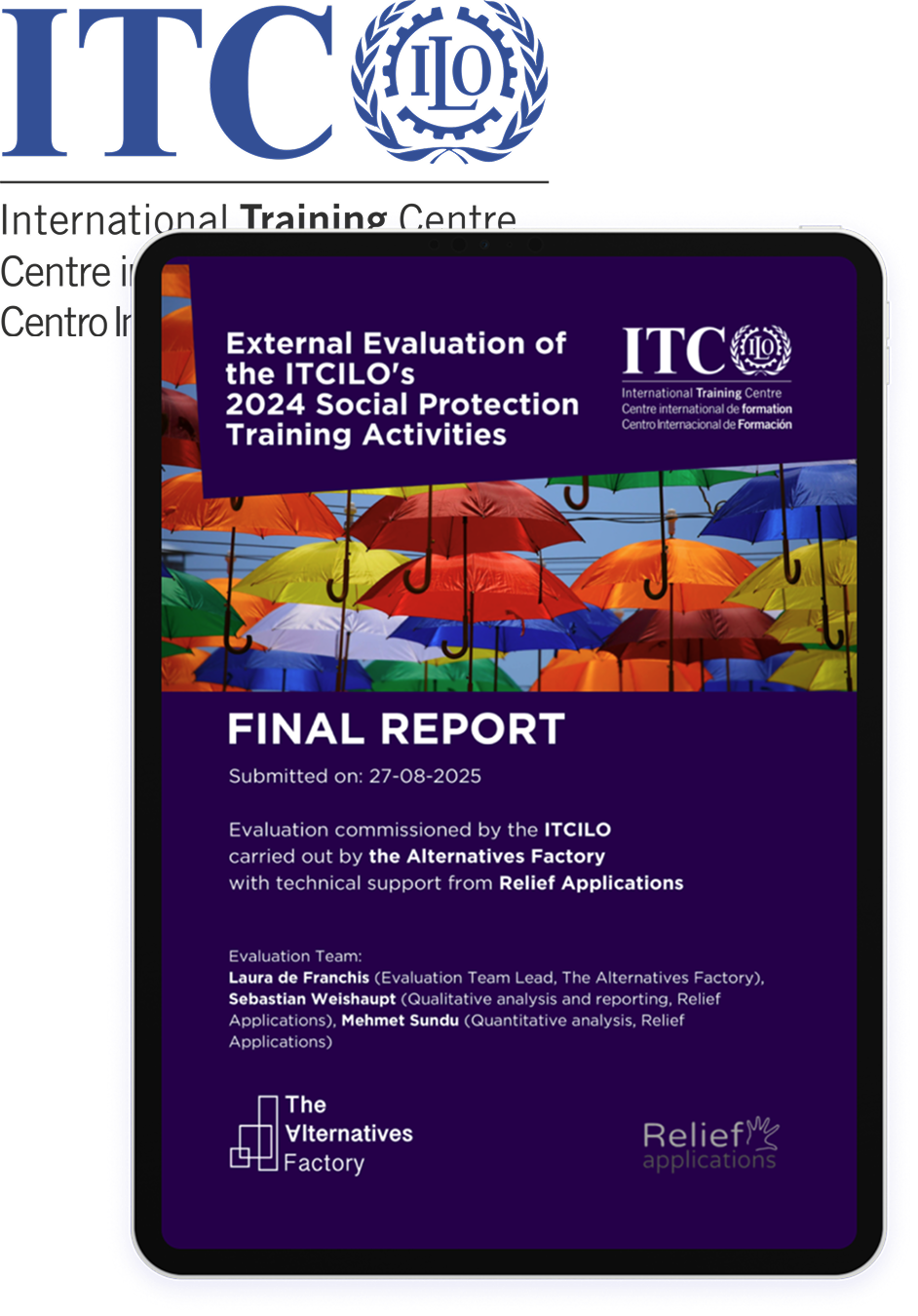ITC ILO - Evaluation of Training Activities on Social Protection 2025

About Project:
Services:
Evaluation & Learning
Information Management
Industry:
Labour Rights
Time-frame:
2 months
Team size:
3 persons
Client / Team:
N/A
Technologies:
Python 3.11 (JupyterLab)
Pandas
NumPy
SciPy
Pingouin
Statsmodels
Scikit-learn
Gemini
NotebookLM
Supported Sustainable Development Goals:





The context
Relief Applications and The Alternatives Factory conducted an external evaluation of ITCILO’s 2024 Social Protection training portfolio for the SPGT Programme. This external evaluation assessed the design, delivery, and outcomes of selected online, blended, and face‑to‑face Social Protection trainings delivered by ITCILO in 2024. The scope covered standard evaluation criteria (relevance, coherence, effectiveness, efficiency, impact, sustainability) and alignment with ISO 29993:2017 learning‑services standards and ITCILO’s Plan–Do–Check–Act (PDCA) quality‑management cycle. The work included desk research, data extraction from MAP/eCampus and course materials, participant survey, key‑informant interviews with ITCILO staff and institutional clients, focus group discussions with learners, and the development of five case studies showcasing good practices and outcomes.
Methodology
The evaluation applied a mixed-methods approach combining quantitative and qualitative techniques to assess the relevance, quality, and impact of ITCILO’s 2024 Social Protection training activities. The methodology was structured around the OECD-DAC evaluation criteria and the Community of Inquiry (CoI) framework to evaluate teaching, social, and cognitive presence in online and blended learning. Key methods included:- Desk Review: Analysis of training documents, course materials, and post-training evaluations to establish context and inform data collection tools.
- Online Survey: Sent to over 1,800 participants across modalities, collecting data on demographics, training design, learner support, delivery preferences, and outcomes.
- Key Informant Interviews (KIIs): Conducted with ITCILO staff, programme managers, and institutional clients to gain strategic and operational insights.
- Focus Group Discussions (FGDs): Held with diverse training participants to explore learning experiences, application, and impact.
- Case Studies: Five in-depth cases were selected to illustrate concrete examples of training uptake and organizational impact. Data from these sources were triangulated using statistical analysis (e.g. ANOVA, regression models) and thematic coding to generate evidence-based findings and recommendations.
Technology Used
- Quantitative analytics: Python 3.11 (JupyterLab); pandas, numpy, scipy, pingouin (reliability; KMO/Bartlett/Cronbach), statsmodels (OLS/logit/ordinal), scikit‑learn (validation & diagnostics); matplotlib & seaborn (figures). Version logging ensured full reproducibility.
- Qualitative support: Gemini (interview transcription); NotebookLM (document querying). Final coding/interpretation done manually with evaluator cross‑checks.
- Reproducibility & QA: Version‑pinned environment, documented notebooks (.ipynb), seeded analyses, codebook, and full pipeline/log archives.
In partnership with The Alternatives Factory, Relief Applications brings stakeholder-centred evaluation leadership together with a reproducible, ISO-aligned analytics stack—turning training data into auditable evidence and actionable improvements across programmes.

The challenge
01.
Measure training quality and learning transfer across modalities.
02.
Assess alignment with ITCILO QA standards and identify improvements.
03.
Generate practical knowledge through case studies for scale‑up.

Our Solution
01.
Mixed‑methods design anchored in OECD‑DAC criteria and the Community of Inquiry (CoI) framework (teaching, social, cognitive presence). Evidence collection combined a large‑scale participant survey, KIIs with programme managers and institutional clients, and FGDs with learners. Statistical modelling and thematic analysis triangulated findings into clear results and visuals.
02.
Map practices to ISO 29993 and PDCA, perform evidence‑mapping and triangulation, document constraints and mitigation, and produce targeted, actionable recommendations for design, delivery, and data systems.
03.
Identify and develop five case studies spanning online, blended, and in‑person modalities, selected for demonstrated post‑training application, geographic/institutional diversity, and potential for replication. Each case documents problem/need, actions taken, evidence of change, sustainability factors, and replicability.
More Details
Portfolio
Contact us
Let's discuss your project
Choose the subject
IT Development
Tech Consulting
Humanitarian Consulting
Web / Mobile Applications
Web Platforms
Chatbots
Field Equipment MS
Case Management System
Monitoring & Evaluation MS
Supply Chain Management System
Voice Assistants
Warehouse Management
Data Management Systems
Refueling Log Book
Custom Applications
